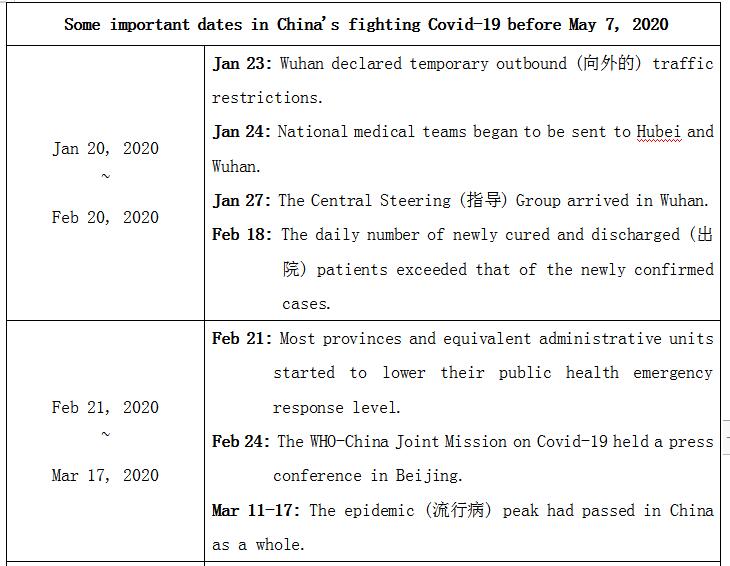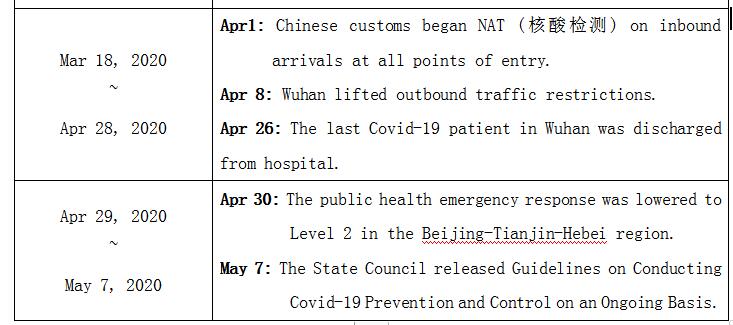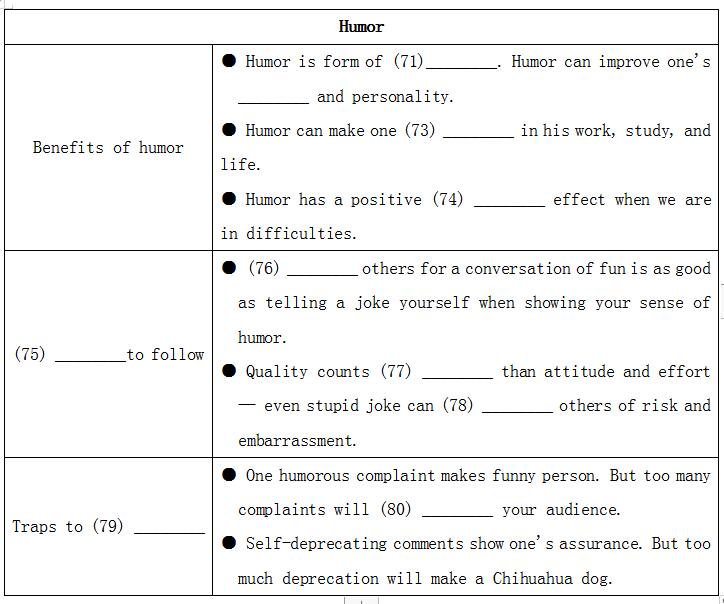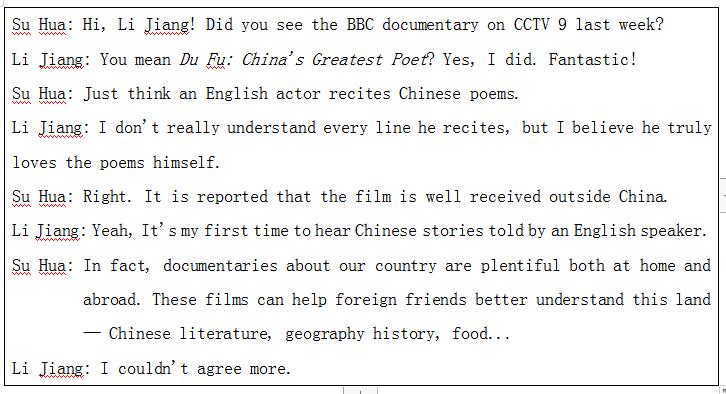| 第 1 页:真题 |
| 第 3 页:参考答案 |
第三部分:阅读理解(共15小题;每小题2分,满分30分)
请认真阅读下列短文,从短文后各题所给的A、B、C、D四个选项中,选出最佳选项,并在答题卡上将该项涂黑。


56. What happened between January 20 and February 20? ( )
A. The Central Steering Group arrived in Wuhan.
B. The WHO-China Joint Mission on Covid-19 held a press conference.
C. The last Covid-19 patient in Wuhan was discharged from hospital.
D. Beijing lowered its emergency response level.
57. From which date were private cars allowed to go out of Wuhan? ( )
A January 23. B. March 11. C. April 8. D. May 7.
B
Sometimes it's hard to let go. For many British people, that can apply to institutions and objects that represent their country's past—age-old castles, splendid homes… and red phone boxes.
Beaten first by the march of technology and lately by the terrible weather in junkyards (废品场), the phone boxes representative of an age are now making something of a comeback. Adapted in imaginative ways, many have reappeared on city streets and village greens housing tiny cafes, cellphone repair shops or even defibrillator machines (除颤器).
The original iron boxes with the round roofs first appeared in 1926. They were designed by Giles Gilbert Scott, the architect of the Battersea Power Station in London. After becoming an important part of many British streets, the phone boxes began disappearing in the 1980s, with the rise of the mobile phone sending most of them away to the junkyards.
About that time, Tony Inglis' engineering and transport company got the job to remove phone boxes from the streets and sell them out. But Inglis ended up buying hundreds of them himself, with the idea of repairing and selling them. He said that he had heard the calls to preserve the boxes and had seen how some of them were listed as historic buildings.
As Inglis and, later other businessmen, got to work, repurposed phone boxes began reappearing in cities and villages as people found new uses for them. Today, they are once again a familiar sight, playing roles that are often just as important for the community as their original purpose.
In rural areas, where ambulances can take a relatively long time to arrive, the phone boxes have taken on a lifesaving role. Local organizations can adopt them for l pound, and install defibrillators to help in emergencies.
Others also looked at the phone boxes and saw business opportunities. LoveFone, a company that advocates repairing cellphones rather than abandoning them, opened a mini workshop in a London phone box in 2016.
The tiny shops made economic sense, according to Robert Kerr, a founder of LoveFone. He said that one of the boxes generated around $13,500 in revenue a month and cost only about $ 400 to rent.
Inglis said phone boxes called to mind an age when things were built to last. "I like what they are to people, and I enjoy bringing things back," he said.
58. The phone boxes are making a comeback ______. ( )
A. to form a beautiful sight of the city
B. to improve telecommunications services
C. to remind people of a historical period
D. to meet the requirement of green economy
59. Why did the phone boxes begin to go out of service in the 1980s? ( )
A. They were not well-designed. B. They provided bad services.
C. They had too short a history. D. They lost to new technologies.
60. The phone boxes are becoming popular mainly because of ______. ( )
A. their new appearance and lower prices B. the push of the local organizations
C. their changed roles and functions D. the big funding of the businessmen
C
For those who can stomach it, working out before breakfast may be more beneficial for health than eating first, according to a study of meal timing and physical activity.
Athletes and scientists have long known that meal timing affects performance. However, far less has been known about how meal timing and exercise might affect general health.
To find out, British scientists conducted a study. They first found 10 overweight and inactive but otherwise healthy young men, whose lifestyles are, for better and worse, representative of those of most of us. They tested the men's fitness and resting metabolic (新陈代谢的) rates and took samples (样品) of their blood and fat tissue.
Then, on two separate morning visits to the scientists' lab, each man walked for an hour at an average speed that, in theory should allow his body to rely mainly on fat for fuel. Before one of these workouts, the men skipped breakfast, meaning that they exercised on a completely empty stomach after a long overnight fast (禁食). On the other occasion, they ate a rich morning meal about two hours before they started walking.
Just before and an hour after each workout, the scientists took additional samples of the men's blood and fat tissue.
Then they compared the samples. There were considerable differences. Most obviously, the men displayed lower blood sugar levels at the start of their workouts when they had skipped breakfast than when they had eaten. As a result, they burned more fat during walks on an empty stomach than when they had eaten first. On the other hand, they burned slightly more calories (卡路里), on average, during the workout after breakfast than after fasting.
But it was the effects deep within the fat cells that may have been the most significant, the researchers found, Multiple genes behaved differently, depending on whether someone had eaten or not before walking. Many of these genes produce proteins (蛋白质) that can improve blood sugar regulation and insulin (胰岛素) levels throughout the body and so are associated with improved metabolic health. These genes were much more active when the men had fasted before exercise than when they had breakfasted.
The implication of these results is that to gain the greatest health benefits from exercise, it may be wise to skip eating first.
61. The underlined expression "stomach it" in Paragraph 1 most probably means "______". ( )
A. digest the meal easily B. manage without breakfast
C. decide wisely what to eat D. eat whatever is offered
62. Why were the 10 people chosen for the experiment? ( )
A. Their lifestyles were typical of ordinary people.
B. Their lack of exercise led to overweight.
C. They could walk at an average speed.
D. They had slow metabolic rates.
63. What happened to those who ate breakfast before exercise? ( )
A. They successfully lost weight. B. They consumed a bit more calories.
C. They burned more fat on average. D. They displayed higher insulin levels.
64. What could be learned from the research? ( )
A. A workout after breakfast improves gene performances.
B. Too much workout often slows metabolic rates.
C. Lifestyle is not as important as morning exercise.
D. Physical exercise before breakfast is better for health.
D
I was in the middle of the Amazon (亚马逊) with my wife, who was there as a medical researcher. We flew on a small plane to a faraway village. We did not speak the local language, did not know the customs, and more often than not, did not entirely recognize the food. We could not have felt more foreign.
We were raised on books and computers, highways and cell phones, but now we were living in a village without running water or electricity It was easy for us to go to sleep at the end of the day feeling a little misunderstood.
Then one perfect Amazonian evening, with monkeys calling from beyond the village green, we played soccer. I am not good at soccer, but that evening it was wonderful. Everyone knew the rules. We all spoke the same language of passes and shots. We understood one another perfectly. As darkness came over the field and the match ended, the goal keeper, Juan, walked over to me and said in a matter-of-fact way, "In your home, do you have a moon too?" I was surprised.
After I explained to Juan that yes, we did have a moon and yes, it was very similar to his, I felt a sort of awe (敬畏) at the possibilities that existed in his world. In Juan's world, each village could have its own moon. In Juan's world, the unknown and undiscovered was vast and marvelous. Anything was possible.
In our society, we know that Earth has only one moon. We have looked at our planet from every angle and found all of the wildest things left to find. I can, from my computer at home, pull up satellite images of Juan's village. There are no more continents and no more moons to search for, little left to discover. At least it seems that way.
Yet, as I thought about Juan's question, I was not sure how much more we could really rule out. I am, in part, an ant biologist, so my thoughts turned to what we know about insect life and I knew that much in the world of insects remains unknown. How much, though? How ignorant (无知的) are we? The question of what we know and do not know constantly bothered me.
I began collecting newspaper articles about new species, new monkey, new spider…, and on and on they appear. My drawer quickly filled. I began a second drawer for more general discoveries: new cave system discovered with dozens of nameless species, four hundred species of bacteria found in the human stomach. The second drawer began to fill and as it did I wondered whether there were bigger discoveries out there, not just species, but life that depends on things thought to be useless, life even without DNA. I started a third drawer for these big discoveries. It fills more slowly, but all the same, it fills.
In looking into the stories of biological discovery, I also began to find something else, a collection of scientists, usually brilliant occasionally half-mad, who made the discoveries. Those scientists very often see the same things that other scientists see, but they pay more attention to them, and they focus on them to the point of exhaustion (穷尽), and at the risk of the ridicule of their peers. In looking for the stories of discovery, I found the stories of these people and how their lives changed our view of the world.
We are repeatedly willing to imagine we have found most of what is left to discover. We used to think that insects were the smallest organisms (生物), and that nothing lived deeper than six hundred meters. Yet, when something new turns up, more often than not, we do not even know its name.
65. How did the author feel on his arrival in the Amazon? ( )
A. Out of place. B. Full of joy. C. Sleepy. D. Regretful.
66. What made that Amazonian evening wonderful? ( )
A. He learned more about the local language.
B. They had a nice conversation with each other.
C. They understood each other while playing.
D. He won the soccer game with the goal keeper.
67. Why was the author surprised at Juan's question about the moon? ( )
A. The question was too straightforward.
B. Juan knew so little about the world.
C. The author didn't know how to answer.
D. The author didn't think Juan was sincere.
68. What was the author's initial purpose of collecting newspaper articles? ( )
A. To sort out what we have known.
B. To deepen his research into Amazonians.
C. To improve his reputation as a biologist.
D. To learn more about local cultures.
69. How did those brilliant scientists make great discoveries? ( )
A. They shifted their viewpoints frequently.
B. They followed other scientists closely.
C. They often criticized their fellow scientists.
D. They conducted in-depth and close studies.
70. What could be the most suitable title for the passage? ( )
A. The Possible and the Impossible
B. The Known and the Unknown
C. The Civilized and the Uncivilized
D. The Ignorant and the Intelligent
第四部分:任务型阅读(共10小题;每小题1分,满分10分)
请认真阅读下面短文,并根据所读内容在文章后表格中的空格里填入一个最恰当的单词。
注意:请将答案写在答题卡上相应题号的横线上。每个空格只填一个单词。
Humor
If you see humor as an optional form of entertainment, you're missing some of its biggest benefits: Humor makes average-looking people look cute and uninteresting people seem entertaining. Studies show that a good sense of humor even makes you seem smarter.
Best of all, humor raises your energy, and that can have an effect on everything you do at school, at work, or in your personal life. The increase of energy will even make you more willing to exercise, and that will raise your overall energy even more.
Humor also transports your mind away from your daily troubles. Humor lets you better understand life and sometimes helps you laugh at even the worst of your problems.
In my experience, most people think they have a sense of humor, and to some degree that's true. But not all senses of humor are created equal. So I thought it would be useful to include some humor tips for everyday life.
You don't have to be the joke teller in the group in order to show your sense of humor. You can be the one who directs the conversation to fun topics that are ripe for others to add humor. Every party needs a straight person. You'll appear fun and funny by association.
When it comes to in-person humor, effort counts a lot. When people see you trying to be funny, it frees them to try it themselves. So even if your own efforts at humor fall short, you might be freeing the long kept humor in others. People need permission to be funny in social settings because there's always a risk that comes with humor. For in-person humor, quality isn't as important as you might think. Your attitude and effort count a lot.
Some people — and I was one of them — believe that humorous complaints about the little problems of life make humor, and sometimes that is the case. The problem comes when you start doing too much complaint-based humor. One funny observation about problem in your life can be funny, but five is just complaining, no matter how smart you think you are. Funny complaints can wear people out.
Self-deprecating humor (自嘲式) is usually the safest type, but here again you don't want to overshoot the target. One self-deprecating comment is a generous and even confident form of humor. You have to be at least a bit self-assured to laugh at yourself in front of others. But if you do it too often, you can transform in the eyes of others from a confident joker to a Chihuahua dog.

第五部分:书面表达(满分25分)
81.请阅读下面有关中国题材纪录片(documentary)的对话,并按照要求用英语写一篇150个词左右的文章。

【写作内容】
1.用约30个词概括上述对话的主要内容;
2.谈谈中国题材纪录片受到外国朋友欢迎的原因(至少两点)。
【写作要求】
1.写作过程中不能直接引用原文语句;
2.作文中不能出现真实姓名和学校名称;
3.不必写标题。
【评分标准】
内容完整语言规范,语篇连贯,词数适当。

微信搜索"考试吧高中资讯" 关注也可获得高考答案
相关推荐:
2020年高考答案pdf下载 | 2020年高考真题pdf下载![]()
2020高考答案![]() | 2020高考真题 | 关注微信对答案 | 2020高考作文
| 2020高考真题 | 关注微信对答案 | 2020高考作文
·江苏2021普通高校招生普通类专科批次录取全面开始 (2021-8-3 10:10:47)
·江苏2021高考体育类、艺术类专科批次录取29日开始 (2021-7-29 17:52:45)
·天津2021高考本科批次A阶段 艺术类本科批次征询志 (2021-7-26 15:35:10)
·江苏2021年高考第一阶段录取信息和填报第二阶段高考志 (2021-7-26 15:30:37)
·江苏江阴2021年高考录取结果查询入口已开通 (2021-7-19)
·免费真题 ·模考试题

2022年上海高考作文题目已公布
2022年湖南高考地理答案已公布
2022年湖南高考生物答案已公布
2022年广东高考地理试题答案已公布
2022年湖南高考生物真题已公布
2022年广东高考真题及答案汇总
2022年浙江高考真题及答案汇总
2022年广东高考生物真题及答案已公布(完整版)
2022年浙江高考政治真题及答案已公布(完整版)
| 国家 | 北京 | 天津 | 上海 | 重庆 |
| 河北 | 山西 | 辽宁 | 吉林 | 江苏 |
| 浙江 | 安徽 | 福建 | 江西 | 山东 |
| 河南 | 湖北 | 湖南 | 广东 | 广西 |
| 海南 | 四川 | 贵州 | 云南 | 西藏 |
| 陕西 | 甘肃 | 宁夏 | 青海 | 新疆 |
| 黑龙江 | 内蒙古 | 更多 | ||




